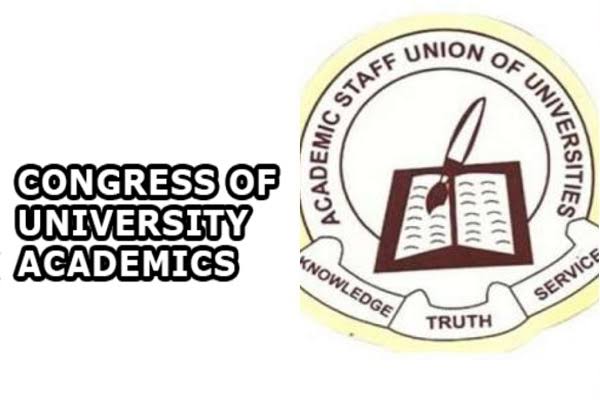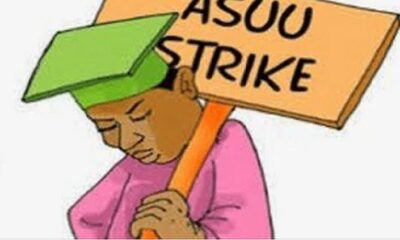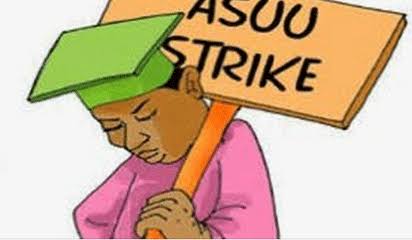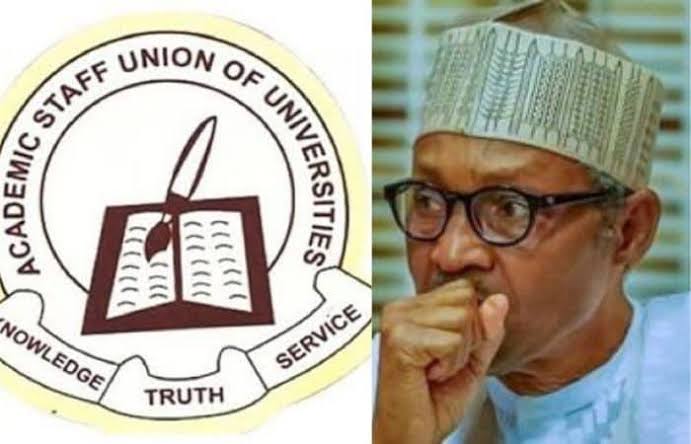Education
As ASUU Calls Off Strike, What Happens To CONUA, NAMDA?

-
Following the suspension of the eight months strike embarked upon by members of the Academic Staff Union of Universities (ASUU) in Nigeria, we have examined what becomes of the fate of the two newly-registered unions by the federal government and if the two unions can subvert the solidity ASUU has built across public varsities in over 15 years.
THE NATION REPORTERS reports that as government universities open their doors to students tomorrow, following the decision of the Academic Staff Union of Universities (ASUU) to obey the ruling of the Court of Appeal compelling it to resume work, all may still not be well. One of the issues that the returning varsity teachers will have to contend with apart from waiting for government to fulfill some of their demands is the issue of newly approved industrial unions for the universities, Congress of Nigerian University Academics (CONUA) and National Association of Medical and Dental Academics (NAMDA).
Though the intention of the government that approved the registration of the two unions has been well advertised, which is to break the firm grip of ASUU on academic operations in government-owned universities, what is not certain is how members of the newly registered unions will function or if they will openly antagonise ASUU in its crusade for improved funding of tertiary education in the bid to effectively play the role government wants them to play.
But ASUU leadership as well as some of its members, who spoke with Sunday Tribune said CONUA and NAMDA were not a threat to their union. According to them, the two unions and their members can never derail ASUU from its objectives. According to ASUU National President, Professor Emmanuel Osodeke, the government can register as many trade unions as it likes, what is of uttermost importance for his union is the success of the crusade to enthrone quality and sound academic culture in the nation’s university system.
It will be recalled that ASUU had, in the early hours of Friday, called off its eight-month-old strike, which it embarked upon on Monday, February 14, 2022 to protest the non-implementation of the 2009 Memorandum of Understanding reached with it by the federal government, stating that despite its suspension of the industrial action, its agitated issues, among which are total revitalisation of public universities and a review of lecturers’ salaries and allowances, have not been satisfactorily addressed by the government.
In the statement signed by its president, Osodeke, the union had said: “NEC deliberated on the recommendations of the Rt. Honourable Femi Gbajabiamila-led committee within the framework of the FGN/ASU’s Memorandum of Action (MoA) of 2020 on the contending issues that led to the strike action.
“For the avoidance of doubt, the issues include funding for revitalisation of public universities, earned academic allowances, proliferation of public universities, visitation panels/release of white papers, university transparency and accountability solution (UTAS) as a broad spectrum software to stop illegality and provide for an alternative payment platform in the university system, renegotiation of the 2009 agreement.
“While appreciating the commendable efforts of the leadership of the House of Representatives and other patriotic Nigerians who waded into the matter, NEC noted with regret that the issues in dispute are yet to be satisfactorily addressed.
“However, as a law-abiding union and in deference to appeals by the president, Major General Muhammadu Buhari (retd), and in recognition of the efforts of Honourable Gbajabiamila, and other well-meaning Nigerians, ASUU NEC resolved to suspend the strike action embarked upon on February 14, 2022.
“Consequently, all members of ASUU are hereby directed to resume all services hitherto withdrawn with effect from 12:01 on Friday, October 14, 2022,” the union had added in the statement.
As part of moves to bring the striking university lecturers back to class, the federal government had reportedly promised to release the sum of N50 billion to take care of outstanding earned allowances and N170 billion for salary increase.
The government also promised to release N300 billion for revitalisation of the institutions and hand over subsequent payments of the lecturers’ salaries and allowances as well as those of other university workers to the governing council of each of the federal institutions from 2024.
There were also reports that the government has pledged to modify the Integrated Personnel and Payroll Information System (IPPIS) to accommodate the peculiarities of the University Transparency Accountability System (UTAS), a payroll system developed by ASUU for the payment of salaries and allowances of university lecturers and the Universities Peculiar Personnel Payroll System (UPPPS) developed by the Joint Action Committee of the Non-Academic Staff Union of Universities and the Senior Staff Association of Nigerian Universities.
But before making these promises, the government had registered CONUA and NAMDA in the heat of the contending battle that lingered between it and the university teachers, a move, many believed was made to clip the wings of the striking lecturers’ union.
While conveying the approval to the leadership of the two unions at a meeting in Abuja, the Minister of Labour, Chris Ngige, had said that their registration would help to liberalise the academic sub-sector and make for more freedom for university workers.
The minister said: “In view of the above, I, Senator Chris Nwabueze Ngige, in the exercise of the power conferred on me as the Minister of Labour & Employment, do hereby approve the registration of CONUA and NAMDA.
“The Federal Ministry of Labour and Employment in the discharge of her mandate in the management of employment relationships and the administration of trade unions to ensure harmonious industrial relations system in the nation has decided to approve the registration of two more trade unions in the Nigerian university academic sub- sector. The university sub-sector is a major development plank of any nation’s socio-economic growth.”
“In view of this registration, you are entitled to all rights and privileges accruable to a union of similar status which include the right to receive check-off dues of members. You can now go back to your institutions and open the doors of your classrooms to teach the students,” the minister had said.
But the government’s move has continued to generate criticisms among stakeholders, who described the action as illegal. Many observers were of the view that aside the Nigeria constitution proscribing the presence of two unions in a sector, the government’s move would create more problems in the system instead of addressing the multi-faceted issues that led to shutting down the public varsities for almost a year.
In response to the public concerns, CONUA National Coordinator, Dr Niyi Sunmonu, had insisted that the union was formed to give a new approach to handling issues affecting universities across the country.
He said: “The registration of the Congress of University Academics (CONUA), as a trade union in the Nigerian university system, is monumentally historic. The hurdles we have faced to get here, since 2018 when we submitted our application for registration, have been seemingly insurmountable. The registration is therefore the validation of the power of the human will. It asserts the value of courage, initiative, focus, tenacity, patience, forbearance and persistent positive thinking.
“We are immensely grateful to the Honourable Minister of Labour and Employment, Dr. Chris Ngige, and his team of diligent staff for insisting on merit, due process and thoroughness all through the processing of our application for the registration of CONUA. The very strict and dispassionate review of our application brought out the best in the membership of the union.
“We regard the registration of CONUA as a sacred trust, and pledge to reciprocate by devoting ourselves unceasingly to the advancement of university education in this country. We would make the details of our programmes available to the public in due course. For now, we are giving the assurance that we would work to ensure that the nation is not traumatised again by academic union dislocations in the country’s public universities…,” the CONUA chairman had said.
He reportedly claimed that since the union was birthed years back, it had made in-roads in keys institutions, like Michael Okpara University of Agriculture, Umudike; University of Benin; Federal University, Lokoja; Federal University, Oye-Ekiti; Kwara State University, Malete; Ambrose Alli University, Ekpoma; Ahmadu Bello University, Zaria; University of Nigeria, Nsukka; University of Jos; and Obafemi Awolowo University, Ile-Ife, among others.
Speaking in the same vein, CONUA chairman, UNIBEN chapter, Dr Ishaq Osagie-Eweka, explained that as a trade union, it is offering a platform to academics seeking to approach issues of conditions of service differently. According to him, CONUA as a union does not believe in strike or closure of universities as an approach to bringing the attention of employers to issues of conditions of service.
“CONUA is a trade union offering a platform to academics seeking to approach issues of conditions of services differently as against the ASUU Marxism approach.
“Therefore, CONUA is here for academics seeking alternative approach to negotiating with employers on conditions of service, strike and closure of universities is a “No” for CONUA,” he had said.
When asked if the coming of CONUA could bring lasting solution to problems bedeviling university education in Nigeria, Osagie-Eweka said CONUA would continue to engage the Federal Government towards ensuring the peculiarities associated with duties of lecturers are captured by IPPIS.
But in its reaction, ASUU described the registration of CONUA and NAMDA by the government as inconsequential, saying their existence does not pose any threat to its existence. Professor Osodeke in his reaction said the government’s move would not in any way affect ASUU.
“The move does not in any way affect us. We are a disciplined and focused union and we know what we are doing and what we are after. Let them register as many unions as they like. That is inconsequential as far as we are concerned. We are not also in any way threatened. The sky is big enough for birds to fly.
“We know our members; we know our strength and we also know what our vision and mission are. Our members are not saboteurs or bootlickers. Our struggle is for a better educational system in the country. If the system is good, all of us will benefit and it is not only ASUU members’ children and wards that are going to benefit from improved funding and the provision of better facilities in our institutions,” he said.
In his own reaction, a former ASUU chairman in Anambra State University and current Head of the Department of Political Science in Nnamdi Azikwe University (UNIZIK), Professor Jaja Nwanegbo told Sunday Tribune that there is no way CONUA will be able to break ASUU due to the strong internal mechanisms and democracy the union has emplaced across the Nigerian universities for decades.
He said that beyond the claims of CONUA national coordinator, the union is not known to many lecturers across Nigeria as it exists mainly in OAU, where it began, following a crisis in the ASUU chapter of that university after falling out with the school management.
“Yes, there is this constitutional provisional provisions that enshrine freedom of association, which allows everyone within an organization to choose to belong or not to belong to a particular association. It must be noted that before the two new unions came onboard, there have been some academic staff members that did not belong to any union at all. So in the light of this, I believe the registration of the two unions will actually not affect ASUU in any way. And this is because even the national coordinator of CONUA had in recent interviews attested to the validity of ASUU’s positions in the struggle that just ended. So for me, I can’t see anything that will pose a challenge to ASUU going forward, considering the fact that the academics know what they want and how they want it. More so, the CONUA is basically an OAU affair,” Nwanegbo said.
“It must be clearly stated that ASUU has not been asking the government to give it one Kobo. In fact, since 1997, all the union has been clamouring for is a total revitalisation of the Nigerian university system, so that the institutions will be better place for learning and human advancement. Yet the government has been clamping down on the union. I believe the newly registered CONUA will power much more agitation than ASUU has done if it’s really a body of academics. I believe the new body too will make the same demands in the coming years if they are really academics. So, I do not see them pulling down the value and strength of ASUU across the universities,” the don added.
Corroborating this assertion, Professor Francis Egbokahre of the University of Ibadan, said: “CONUA has been around for quite a while. But they seem to find strength when there is an ASUU crisis. I simply don’t think they have a concrete agenda of their own. And if they have, I believe it hasn’t been persuasive. I don’t see them as a group that can undermine the solidity of ASUU in any way.
“First of all, their membership strength is not convincing. It is just a case of individuals who are unhappy with the status quo, but have not been able to muster enough strength and energy across the country to be able to win any soul. Don’t forget that they arose from OAU as a result of an internal crisis, which then turned into an ASUU crisis with the branch. So it is still basically an OAU affair and a little bit in UNIBEN too. Above all, as far as I am concerned, I don’t really see them, including NAMDA, being a force within the academia. I would have loved to see more credible individuals with academic presence and the kind of value and ideological weight we have in ASUU. I believe if no union has been able to break the rank of ASUU for over 15 years, I don’t see how these two new unions can do that now,” the don explained.
Source: Nigerian Tribune
-

 Breaking News2 years ago
Breaking News2 years agoBREAKING: CBN Redesigns Naira Notes
-

 Breaking News11 months ago
Breaking News11 months agoBREAKING: Tinubu Considers Temporary Subsidy On Petrol
-

 News2 years ago
News2 years agoDrama As Church Gives Certificate Of Virginity To Ladies After Testing Them (See Photos)
-

 Crime2 years ago
Crime2 years agoUproar As Student Teacher On Teaching Practice Impregnates 24 Girls, Headmistress, Four Female Teachers
-

 Breaking News3 months ago
Breaking News3 months agoJUST IN: Gbajabiamila Dies In UK
-

 Breaking News9 months ago
Breaking News9 months agoBREAKING: Dangote Speaks As BUA Reduces Price Of Cement
-

 Breaking News11 months ago
Breaking News11 months agoFLASH: Govt Declares Monday As Public Holiday
-

 Crime2 years ago
Crime2 years agoJUST IN: Gunmen Storm Osogbo, Kill Man, Daughter Few Hours After His Wife Put To Bed (Photos)









